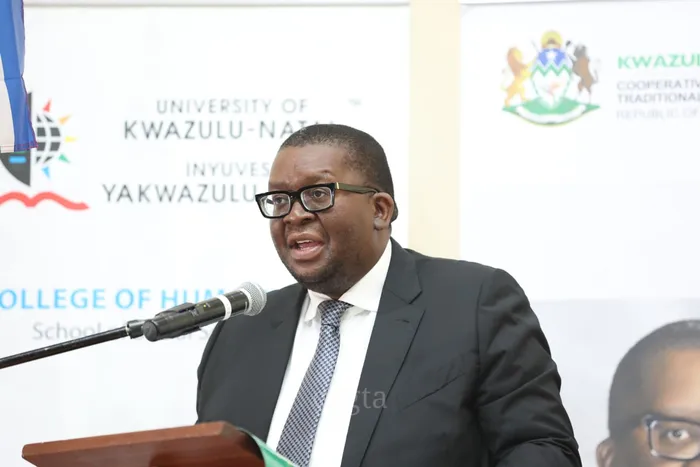
KwaZulu-Natal MEC for Cogta Thulasizwe Buthelezi engaged with Mayors on the state of municipalities in the province earlier this week.
Image: Supplied
Only 19 of the 54 municipalities in KwaZulu-Natal are stable while 28 are deemed “at risk” and seven are “in distress,” according to a report looking into the state of municipalities in the province.
The report was tabled during a meeting between the Department of Cooperative Governance and Traditional Affairs (Cogta) and municipalities held in Durban on Monday.
Top government officials stated that if a municipality is unstable, it affects service delivery to communities, something that should be avoided. The provincial treasury has indicated that it has experts ready to be deployed to any struggling municipalities.
The report, titled Back to Basics, examined the state of local government between last year and March this year and was finalised in May this year. It is part of Cogta's ongoing work to monitor the performance of municipalities by undertaking a comprehensive analysis of their state.
This includes identifying common and specific challenges impacting the stability and functionality of municipalities in delivering services to communities. The assessment outlined the process for this evaluation, stating that key performance indicators were allocated a weighting, and points were assigned according to the actual performance against these indicators.
The KZN assessment revealed the following findings in terms of categorising municipalities:
The report stated, “Since the advent of a democratic local government, there have been many government support programmes aimed at advancing service delivery and institutional support to municipalities, the latest being the Back to Basics programme and the District Development Model.”
“The national government has also allocated significantly large sums of money in the form of grants to build municipal capacity and to address the municipal infrastructure backlog over the years. Despite the valuable service delivery milestones that have been achieved since the dawn of democracy and the support provided, it is clear that local government still remains in distress and has not reached the sustainability stage as envisaged by the White Paper in 1998.”
Many assessments have been undertaken, and generally, at the forefront of local government challenges are the following:
However, the assessment recorded good work being undertaken by a majority of municipalities in KwaZulu-Natal. Many councillors and officials work under extremely difficult conditions, yet they continue to perform well. However, the assessment has found that there are still stubborn governance, administrative, financial, and service delivery challenges that consistently prevent the achievement of the objectives of developmental local government.
Marlaine Nair, the chairperson of the Cogta portfolio committee, said the instability of municipalities directly affects service delivery. “As the Cogta Portfolio Committee, we are calling on the Department of Cogta to not just provide support to municipalities in need but also ensure that there is swift consequence management to avoid repeat irregularities and ongoing corruption and maladministration. Corruption must be rooted out.
“We also call on councillors to properly perform their oversight duties. We cannot have councillors turning a blind eye and accepting write-offs of billions without proper reasoning or the tabling and support of unfounded budgets,” she said.
Finance MEC Francois Rodgers expressed concern about poor fiscal management at the local government level, stating, “As Treasury, we have always made it clear that we have a task team that can and will assist municipalities when it comes to fiscal compliance, but the reality is that we need the political buy-in from the mayor and council. Often, where we do try to assist, like in uMkhanyakude, we don’t get that.”
Acting Cogta HOD, Dr Joey Krishnan, said the MEC in his Budget policy speech announced measures aimed at stabilising and improving the seven distressed municipalities.
“We are focusing on targeted support to municipalities for them to do what is expected of them. This includes financial experts and other forms of technical support including the Provincial Project Management Unit, which will ensure that catalyst projects are implemented to unlock growth.
“We are also rolling out the cluster model which brings the department closer to these municipalities. As we saw yesterday (Monday) through these cluster engagements, accountability and service delivery take centre stage with other key stakeholders such as Eskom, the Water Board, and the AG, amongst others being afforded the opportunity to engage directly with municipalities with the aim of resolving bottlenecks,” said the acting HOD.
Related Topics: